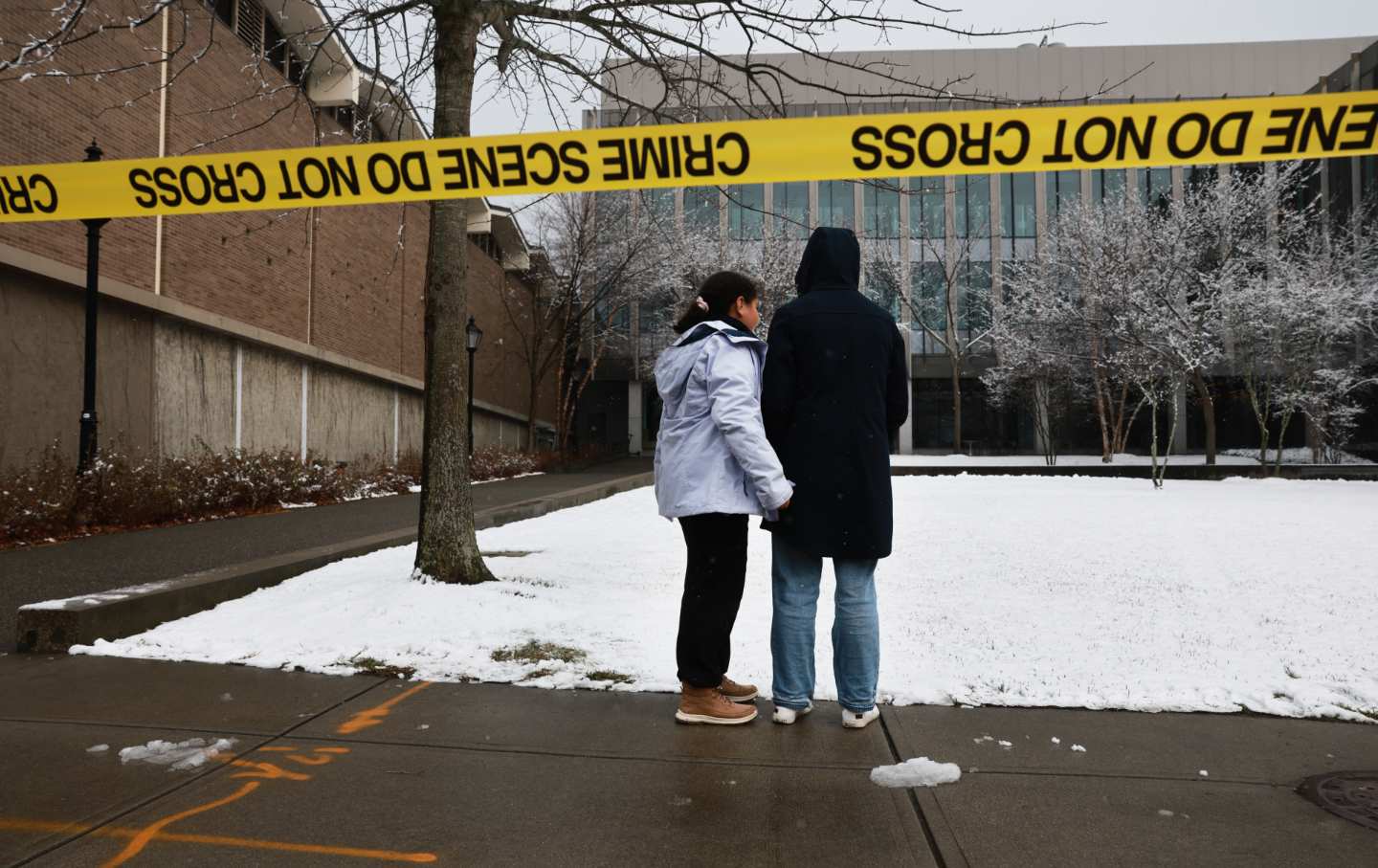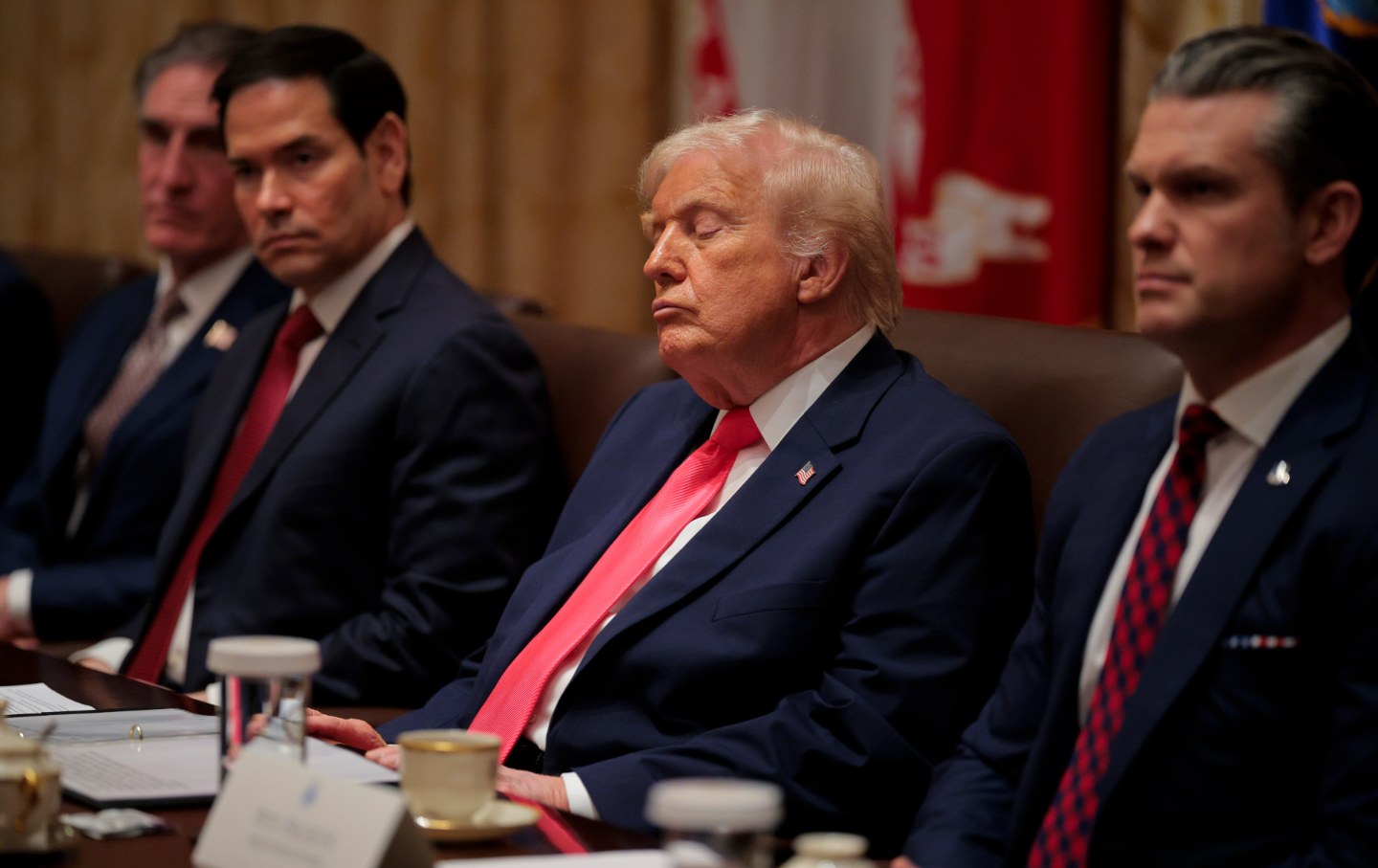Is Donald Trump on Drugs? If Not, He Should Be.
His true addiction explains the president’s doziness.

Cameras are not allowed in the Manhattan courtroom where Donald Trump, for the first time, is facing evaluation on a criminal case from a jury of his peers. But we have some accounts from observers that present almost as vivid an image as a good photo. The most memorable of these accounts focus on the former president’s seeming to float off into slumberland. Last Monday, Maggie Haberman, a preternaturally sensitive barometer of Trump’s emotional weather, observed in The New York Times: “Even as a judge was hearing arguments on last-minute issues in a criminal case that centers on salacious allegations and threatens to upend his bid for the presidency, Mr. Trump appeared to nod off a few times, his mouth going slack and his head drooping onto his chest.”
The following day, another reporter, Frank G. Runyeon of Law360, provided a vivid battlefield account of the mortal combat between the forces of alertness and drowsiness inside Trump’s brain:
Trump’s head slowly dropped, his eyes closed. It jerked back upward. He adjusts himself. Then, his head droops again. He straightens up, leaning back. His head doops for a third time, he shakes his shoulders. Eyes closed still. His head drops. Finally, he pops his eyes open.
I confess that, reading these accounts, I immediately started speculating on a pharmaceutical explanation. Not that I think Trump is doing illicit drugs such as heroin or morphine—but perhaps something perfectly legal such as Xanax, which helps with anxiety and has side effects perfectly congruent with Trump’s languidness in the face of the law.
One reason my mind went in that direction is that Trump has repeatedly accused rival presidential candidates of using “performance-enhancing drugs,” as if the election were a professional sports competition that you can cheat at by juicing. He made this indictment against Hillary Clinton in 2016 and against Joe Biden in both 2020 and 2024.
Trump is almost a textbook embodiment of the psychological process of projection. He rarely hurls an accusation that is not also a confession, as when he accuses his foes of being corrupt, dishonest or racist. Given this pattern, Trump’s habit of making up allegations of substance abuse is worth flagging as, at the very least, suspicious.
Further raising suspicion was Trump’s closeness to Republican Representative Ronnie Jackson, who served as his personal doctor in 2017 and ’18. In January of this year, the Department of Defense released a scathing report on Jackson’s tenure running the White House Medical Unit. According to the report, “We found that the White House Medical Unit provided a wide range of health care and pharmaceutical services to ineligible White House staff in violation of Federal law and regulation and DoD policy. Additionally, the White House Medical Unit dispensed prescription medications, including controlled substances, to ineligible White House staff.”
All of this is circumstantial, of course, but troubling. The core problem is that the psychological and medical condition of presidents and presidential candidates is often opaque. After the fact, historians can tell us about John F. Kennedy’s extensive use of painkillers or Richard Nixon’s alcoholism (which became so bad during Watergate that the Pentagon created a system whereby control of the nuclear weapons was temporarily transferred to powerful cabinet members such as Secretary of State Henry Kissinger).
The American presidency is in reality an elected monarchy. Since 1945, it has been a thermonuclear monarchy, where terrifying decisions concerning the survival of humanity are put in the hands of one frail, all-too-human commander in chief. Given these realities, the public has a right to know about any medications Biden or Trump might be taking.
Having said that, Xanax is only one possible explanation for Trump’s courtroom sleepiness. Democrats have jumped on this story as proof that age is wearing Trump down. This allows them to flip Trump’s “Sleepy Joe” gibe and promote the idea of “Sleepy Don.” It’s unfortunate that there are no photos of Trump’s judicial naps, because they would make a strong counterargument in the dispiriting dispute over which presidential candidate is the most decrepit.
While the “Trump is old” argument is true, there’s an additional factor to consider. Trump’s true addiction is not to any sedative—but to his own ego. He is used to being the star of the show and getting his own way. In the courtroom, Trump is forced to be subservient to an imposing legal process where a judge presides and a jury of ordinary citizens are the ultimate arbiters.
In such an environment, Trump is surely suffering from wounded narcissistic pride. No wonder his mind, horrified at the prospect of being treated as just another citizen, flees into the safety of dreamland.
As Alex Shepherd noted in The New Republic, it was immensely satisfying that Trump, during the jury selection process, had to listen to mean social media posts about him from run-of-the mill New Yorkers:
As a president and postpresident, however, Trump has rarely had to face criticism in person. He carefully curates his public events so as to almost never encounter critics of any stripe. His life is spent at a private club or on a golf course. He skipped every White House Correspondents Dinner as president. His rallies are filled with gushing supporters. He lives in a fantasy world in which Hollywood, the media, and political elites despise him—but the people love him.
Being in a criminal trial has forced Trump to leave that fantasy world. A man who has a desperate need to see himself as a domineering winner is forced to live in brutal reality where he is in the precarious position of being a potential felon.
Writing on Sunday in The New York Times, Maggie Haberman made parallel observations: “Everything about the circumstances in which the former president comes to court every day to sit as the defendant in the People v. Donald J. Trump at 100 Centre Street is repellent to him.”
Haberman added:
Popular
“swipe left below to view more authors”Swipe →Trials are by nature mundane, with strict routines and long periods of inactivity. Mr. Trump has always steered clear of this type of officialism, whether by eschewing strict schedules or anyone else’s practices or structures, from the time he was in his 20s through his time in the Oval Office.
The mundanity of the courtroom has all but swallowed Mr. Trump, who for decades has sought to project an image of bigness, one he rode from a reality-television studio set to the White House.
Trump’s foes have every reason to relish the current moment. Both the outcome of the court case and the election are up in the air. It is entirely possible that he could win court cases even where his guilt is manifest (the example of O.J. Simpson, recently dead, should remind us of that). Trump could also win the presidency again, which would render almost all the court cases moot. (Even the ones that are in state courts—such as current Manhattan trial or the Georgia case involving Trump’s efforts to overturn the election—would fall into political difficulty, since it’s almost inconceivable that a Republican Supreme Court would allow a duly elected Republican president to be jailed in office.) So Trump’s current misery should be mined for every ounce of schadenfreude it currently provides.
However, the pathos of the scene before us shouldn’t escape notice. Because Trump’s true addiction is to his self-regard—and because his ego is a black hole that devours everything around him—there is no reason to hope for improvement. You can always kick a drug addiction. But there is no 12-step program that will cure the true sickness that ails Trump’s soul.
Disobey authoritarians, support The Nation
Over the past year you’ve read Nation writers like Elie Mystal, Kaveh Akbar, John Nichols, Joan Walsh, Bryce Covert, Dave Zirin, Jeet Heer, Michael T. Klare, Katha Pollitt, Amy Littlefield, Gregg Gonsalves, and Sasha Abramsky take on the Trump family’s corruption, set the record straight about Robert F. Kennedy Jr.’s catastrophic Make America Healthy Again movement, survey the fallout and human cost of the DOGE wrecking ball, anticipate the Supreme Court’s dangerous antidemocratic rulings, and amplify successful tactics of resistance on the streets and in Congress.
We publish these stories because when members of our communities are being abducted, household debt is climbing, and AI data centers are causing water and electricity shortages, we have a duty as journalists to do all we can to inform the public.
In 2026, our aim is to do more than ever before—but we need your support to make that happen.
Through December 31, a generous donor will match all donations up to $75,000. That means that your contribution will be doubled, dollar for dollar. If we hit the full match, we’ll be starting 2026 with $150,000 to invest in the stories that impact real people’s lives—the kinds of stories that billionaire-owned, corporate-backed outlets aren’t covering.
With your support, our team will publish major stories that the president and his allies won’t want you to read. We’ll cover the emerging military-tech industrial complex and matters of war, peace, and surveillance, as well as the affordability crisis, hunger, housing, healthcare, the environment, attacks on reproductive rights, and much more. At the same time, we’ll imagine alternatives to Trumpian rule and uplift efforts to create a better world, here and now.
While your gift has twice the impact, I’m asking you to support The Nation with a donation today. You’ll empower the journalists, editors, and fact-checkers best equipped to hold this authoritarian administration to account.
I hope you won’t miss this moment—donate to The Nation today.
Onward,
Katrina vanden Heuvel
Editor and publisher, The Nation
More from
Jeet Heer 

The Shocking Confessions of Susie Wiles The Shocking Confessions of Susie Wiles
Trump’s chief of staff admits he’s lying about Venezuela—and a lot of other things.

Why Epstein’s Links to the CIA Are So Important Why Epstein’s Links to the CIA Are So Important
We won’t know the full truth about his crimes until the extent of his ties to US intelligence are clear.

In America, Mass Shooting Survivors Can Never Know Peace In America, Mass Shooting Survivors Can Never Know Peace
A growing number of US residents have lived through more than one massacre.

Corporate Democrats Are Foolishly Surrendering the AI Fight Corporate Democrats Are Foolishly Surrendering the AI Fight
Voters want the party to get tough on the industry. But Democratic leaders are following the money instead.

Sleepy Donald Snoozes, America Loses Sleepy Donald Snoozes, America Loses
It’s bedtime for Bozo—and you're paying the price.

The Revolt of the Republican Women The Revolt of the Republican Women
Speaker Mike Johnson’s sexism is fueling an unexpected uprising within the GOP caucus.


